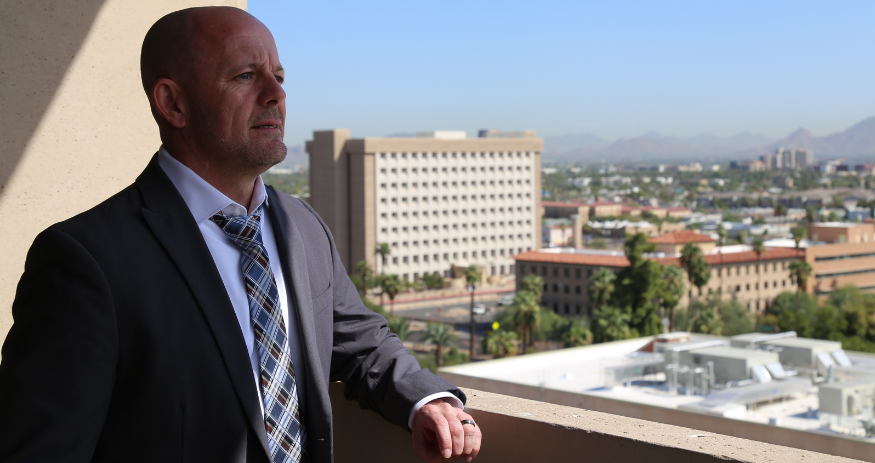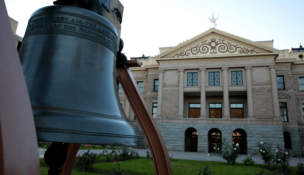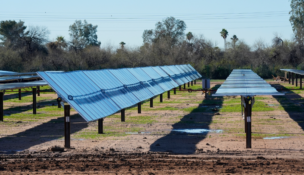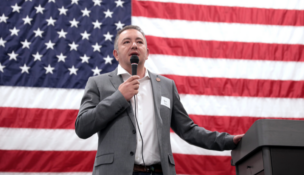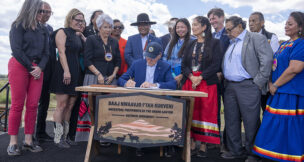Chad Campbell: The Governor’s chief of staff on service, learning and going fast
Reagan Priest Arizona Capitol Times//October 25, 2024//[read_meter]
Chad Campbell: The Governor’s chief of staff on service, learning and going fast
Reagan Priest Arizona Capitol Times//October 25, 2024//[read_meter]
After stints in the Legislature and the private sector, Chad Campbell joined Gov. Katie Hobbs’ administration in 2023 as chief of staff, where he says he continues to learn more about state government “every hour.” Campbell told the Arizona Capitol Times that he loves serving his state, but he won’t be caught running for office again.
The questions and answers have been edited lightly for style and clarity.
Q: You’ve been in this role for over a year now. What have you enjoyed about it, and what have you learned?
It’s a fascinating job. It’s never a dull moment. I think that the fast pace of it, moving from one subject matter to the next, one issue to the next, is something that I love to do. So, that’s really the exciting part of the job for me. I’ve been in state government or around state government in one way, shape or form for 20 years. But I’ll be the first to admit, I had no idea the daily operations of the governor’s office. Learning the complexity of what state government takes to run every day has been just absolutely fascinating to me. I’m still learning every day, probably every hour at this point. But I think that really is what I just love about this job. I’m always learning something. We’re always trying to figure out how to serve the people of the state.
Q: You and Gov. Hobbs go way back. Does that make the job easier?
I think it does, in the sense that her and I have served together in the Legislature. We worked together outside the Legislature, so I think that I know her priorities pretty well, and I think that makes it a lot easier coming in. I know her expectations. I know what she wants to accomplish as governor, and I know what her philosophy is in governing. I’ve known that since she ran for office back in the day. I was involved in her first campaign. I was in the Legislature and helped her when she was running for the first time. So, I really know what she cares about. I think that really does help. It’s kind of a natural extension for me to translate her vision when I start looking at how the agencies are being run and working with stakeholders and all those folks involved. It’s also a lot of pressure, because she knows that I know what she wants, so I gotta deliver.
Q: How has your perspective changed after moving from the Legislature to consulting to the governor’s office?
A lot of folks don’t understand the complexities of the executive branch. So that’s been eye-opening for me. I don’t think my perspective on governing has changed. If anything, it’s reinforced in me the importance of governing, and it’s reinforced in me the impact good governance has on people’s lives, and conversely, the impact bad governance has on people’s lives. It’s really made me appreciate the role of the folks who make government work every day. It also makes me appreciate more the partnerships that we need to develop with the private sector, with the nonprofit sector, with those outside stakeholders that I think gets lost sometimes. State government can’t make everything work without partnerships with the private sector or the nonprofit sector and vice versa. And you see that when you talk about economic development, delivering services to folks, whatever it may be. It’s really reinforced that necessity for teamwork and collaboration across all sectors to get things done.
Q: What do you wish the average Arizonan knew about state government?
I wish more people knew how hardworking the average state employee is. State workers, in a lot of cases, are underpaid and overworked, and that’s probably lost on people. I think that people have this perception or this caricature of the typical bureaucrat, and it’s just not the truth. You have a lot of people that work in the public sector that do it for love of service and love of the community. Quite frankly, they could probably make more money in the private sector if they wanted to, and they don’t. They choose to stay in the public sector because they want to deliver that impact.
Q: What has it been like seeing negotiations from the executive perspective, rather than the legislative perspective?
That’s a tough question to answer. You’re just sitting on a different side of the table in some ways. The one thing that I think some people don’t think about or don’t connect the dots on sometimes is when you talk about the executive branch versus legislative branch, or versus a stakeholder, the governor’s office is not the [executive] tower. It’s also all the state agencies out there that are really the ones more intrinsically involved in actually executing on the governor’s plans than anybody in the tower. So when we’re thinking about how we negotiate a budget, when we’re thinking about how we work on a legislative package, whatever it may be, we think about that big web of that state enterprise and how we’re going to actually pull it off. I say this with love to my legislative friends. When the session ends, they don’t have to worry about actually implementing the things that were passed. We have to implement the laws. We have to execute on the things that were done during session. We have to think about, “how do you actually deliver?”
Q: Chief of staff is an intense job. What do you do to keep yourself sane?
Mountain biking is my favorite thing I do. The one thing I miss after taking this job, I’ll admit, was I had to give up my racing. I’ve been racing for the past couple years, and I do not have the time to train for racing. So that’s on my bingo card later on down in life. I mountain bike as much as I can, not as much I would like, obviously. I’m a pretty avid reader. I am a sports fanatic, especially when it comes to baseball. I’m a huge beer snob, so I love to go to the breweries when I can. I drag my wife with me. Even though she’s not much of a beer fan, she’ll go with me. But if I’m on my bike, I’m a pretty happy person.
Q: Could you see yourself running for public office again?
No, I will leave that to my boss and others to do. I don’t really have any interest in running for office again. This was not some grand plan of mine to come back into the public sector, to be very honest. I came back, though, for a couple reasons. I’m a native Arizonan. I love my state. I would do anything for my state. To have this job, and it probably sounds a little corny, is really the greatest honor of my life. Honestly, from a professional standpoint, serving for the governor of Arizona is incredible and especially for my boss, for the current governor, because I’ve known her forever, I know what she stands for, I know her values. So, it made it easy for me to come back into the public sector with this opportunity and the person I’d be working under. But it wasn’t some grand plan, and it’s by no means some plan to go back into running for office. I just love what I do, and really, I love serving the state, and so that is why I’m here.
Q: Is there anything you miss about being in the Legislature?
Nope. When I was there, it was very different. It was not as polarized. We did not have social media as much, which I think is the end of the world. We just didn’t have that overlay. We could fight on the floor and go have a beer afterwards. When I was Dem leader, Andy Tobin was speaker at that time, and we would fight on the floor and then go have a beer afterwards. That’s how it worked. When Kirk Adams was speaker and I was leader, we would fight on the floor and we’d be friends afterwards. We’d work through our differences in a more civil way. I hope that we get back to that. It’s not just here, that’s nationally too, obviously. So no, I don’t really miss [it]. It was a great time while I was there, but I’ll leave it for those who want to run for office.
Q: Arizona will swear in a group of freshman lawmakers next year. What advice would you give them?
I’d say three things. First and foremost, get outside of your Twitter bubble. That’s like the biggest thing. Twitter is not the real world. Your social media bubble is usually going to be surrounded by people who already have a certain bias. You need to get outside of that and talk to other people. The second one is listen. Listen to folks that disagree with you, listen to people who’ve been doing this a long time, listen to stakeholders. They have a lot of valuable information and context that you probably don’t have as a freshman lawmaker. Then number three is, enjoy it. If you don’t enjoy it, why do it? I think that that’s also something I’ve seen in politics, is people are just angry so often. Why are we all so angry all the time? Enjoy the job. Get to know your colleagues, even the ones across the aisle from you who have differing opinions, get to know them a little bit on a human level.

